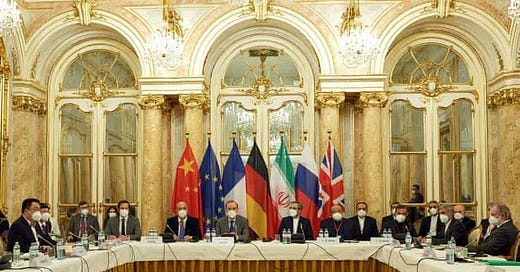Emerging Markets Daily - December 3
Iran Nuke Talks Crisis, Grab's Dismal Nasdaq Debut, Turkey Economic Crisis Unravels Years of Gains, Brazil Recession, Mukesh Ambani Bullish on Blockchain
The Top 5 Stories Shaping Emerging Markets from Global Media - December 3
Iran Nuclear Talks on Brink of Crisis As Meetings Continue Next Week
Reuters
“Indirect U.S.-Iranian talks on salvaging the 2015 Iran nuclear deal teetered on the brink of crisis on Friday as they broke off until next week with European officials expressing dismay at the demands of Iran's new hardline administration.”
“The seventh round of talks in Vienna is the first with delegates sent by Iran's anti-Western President Ebrahim Raisi. His election in June caused a hiatus in the talks of five months, heightening suspicions among U.S. and European officials that Iran is playing for time while its makes nuclear advances.”
“The Iranian delegation under nuclear negotiator Ali Bagheri Kani has proposed sweeping changes to the text of an agreement negotiated in previous rounds, diplomats said. European officials have balked at the proposed changes to a painstakingly drafted text that they say is 70-80% finished.”
"‘Over five months ago, Iran interrupted negotiations. Since then, Iran has fast-forwarded its nuclear program. This week, it has back-tracked on diplomatic progress made,’ senior officials from France, Britain and Germany said in a statement, adding that Iran was demanding ‘major changes’ to the text. It is ‘unclear how these new gaps can be closed in a realistic time frame’, they added.”
“The three European powers expressed ‘disappointment and concern’ at Iran's demands, some of which they said were incompatible with the deal's terms or went beyond them...” Reuters reports.
Singapore’s Grab Dismal Nasdaq Debut a Warning to ASEAN Tech Startups
Nikkei Asia
“Singaporean superapp Grab's much-anticipated U.S. listing turned out to be a bitter debut on Thursday, with shares ending their first trading day down nearly 21%.”
“While Grab's longer-term price performance remains to be seen, one analyst says the initial slump is a warning for other Southeast Asian startups planning to go public to target ‘more realistic valuations.’”
“Shares of Grab -- which merged with already-listed special purpose acquisition company (SPAC) Altimeter Growth -- jumped at the U.S. market opening but plunged later. Grab's market capitalization was about $34.6 billion at Thursday's closing, falling short of the $40 billion expected by Altimeter in the SPAC deal.”
"‘This was an interesting debut that was never going to be easy given the SPAC route to market and with the backdrop of omicron,’ said Angus Mackintosh, founder of CrossASEAN Research, referring to the new coronavirus variant that has sent jitters through stock markets over the past week…”
“Justin Tang, head of Asian research at United First Partners, said the competitive environment in Southeast Asia was another factor behind the Grab sell-off. Competition from other startups and incumbent financial institutions, he said, ‘will limit how easily Grab can expand in Southeast Asia.’”
“Grab's superapp offers a wide range of services in Southeast Asia -- from ride-hailing and delivery to finance. The company has stressed the region's growth potential but continued to report big losses.” Nikkei Asia reports.
Turkey Economic Turmoil Unravels Years of Gains
Wall Street Journal
“The two-decade economic boom that lifted millions of Turks into the middle class is beginning to unravel, threatened by a currency crisis that has people lining up for subsidized bread, cutting back on meat and fleeing for a better life in Europe.”
“The Turkish lira has lost as much as 45% of its value this year, making ordinary Turks poorer. The pandemic-era consumer-price increases that have plagued economies across the world are supersize in Turkey, where inflation stands at more than 21%. People here are rushing to trade their shrinking wages for dollars and gold, are eating out less and are having more trouble finding imported goods, including medicine.”
“The crisis largely stems from President Recep Tayyip Erdogan’s own economic policies, say economists both inside and outside Turkey. After nearly two decades in power, Mr. Erdogan has fired nearly every economic official who had stood in the way of his unorthodox views, and has steered the country down a path few, if any, economies the size of Turkey have charted.”
“After years in which he has weakened Turkish institutions and centralized power, Mr. Erdogan has now assumed broad control over the economy, with no one within the government to oppose him, former Turkish officials say…”
“Turkey, a G-20 economy and a leader among emerging markets, is a North Atlantic Treaty Organization ally and a key security partner for the U.S. Financial instability there could ripple through the Middle East. It could also threaten Ankara’s ambitions to become a power broker in the region, where it has acted as a counterweight to Russia while intervening in conflicts in Libya, Syria and Iraq.”
“The free-falling lira has also fueled concerns that the crisis could tip over into broader financial instability, with economists warning of the risk of a bank run or a credit crunch. It is the most serious test Turkish financial institutions have faced in decades, according to bankers and former Turkish officials…”
“The lira’s devaluation is fueling discontent among the working and middle-class Turks who form the backbone of support for Mr. Erdogan and his Justice and Development Party (AKP). After years in which he has survived a military coup and steered Turkey through wars and instability in the wider Middle East, Mr. Erdogan now risks a revolt among his political base.” The WSJ reports.
Brazil Economy Stumbles into Recession
Financial Times
“The Brazilian economy entered a technical recession in the third quarter as surging inflation choked off its pandemic recovery. Third-quarter data released on Thursday showed a 0.1 per cent contraction in gross domestic product from the previous quarter, when it shrank 0.4 per cent.”
“Compared with the third quarter of last year, the economy expanded 4 per cent. The contraction was driven primarily by an 8 per cent drop in agriculture, which has been affected by an unprecedented drought, and a 9.8 per cent decline in the export of goods and services. Industry remained stagnant, while services grew 1.1 per cent.”
“‘The economy has basically stagnated. We reached the pre-Covid level, but since then there has been no growth at all and there is no indication that growth will come,’ said Mauricio Molon, chief economist at Logus Capital in São Paulo. Latin America’s largest economy had rebounded quickly from the initial impact of Covid-19, with GDP in the first quarter of this year returning to where it was before the pandemic struck at the end of 2019.”
“Since then, however, the recovery has lost steam and some economists have forecast a contraction next year. Presidential elections in October also threaten to bring uncertainty. Paulo Guedes, Brazil’s finance minister, has remained bullish, telling the Financial Times recently that Brazil would ‘surprise the world again’ and continue its ‘V-shaped recovery’.” The FT reports.
Blockchain Will Redefine Financial World: Mukesh Ambani
LiveMint India
“Mukesh Ambani, chairman and managing director, Reliance Industries Ltd (RIL) on Friday said he believes in blockchain technology and that the technology is set to redefine the financial world.”
“Ambani was talking in an interview at the virtual Infinity Forum, hosted by International Financial Services Authority (IFSCA), GIFT City and Bloomberg. ‘Blockchain is the technology I believe in. We are on the verge of introducing a data privacy bill, which I look forward to, and also the crypto currency bill. So I think we are on the right track,’ Ambani said, adding that India is witnessing a digital-first revolution and the country is on the verge of building a digital society.”
“A bill for regulating cryptocurrency as a financial asset while safeguarding small investors, is in the works. The legislation may stipulate a minimum amount for investments in digital currencies while banning their use as legal tender.” LiveMint reports.
“Not everything that counts can be counted, and not everything that can be counted counts.” Quote attributed to Albert Einstein.





